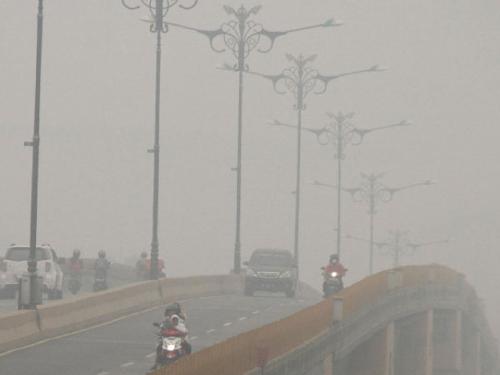-
Tips for becoming a good boxer - November 6, 2020
-
7 expert tips for making your hens night a memorable one - November 6, 2020
-
5 reasons to host your Christmas party on a cruise boat - November 6, 2020
-
What to do when you’re charged with a crime - November 6, 2020
-
Should you get one or multiple dogs? Here’s all you need to know - November 3, 2020
-
A Guide: How to Build Your Very Own Magic Mirror - February 14, 2019
-
Our Top Inspirational Baseball Stars - November 24, 2018
-
Five Tech Tools That Will Help You Turn Your Blog into a Business - November 24, 2018
-
How to Indulge on Vacation without Expanding Your Waist - November 9, 2018
-
5 Strategies for Businesses to Appeal to Today’s Increasingly Mobile-Crazed Customers - November 9, 2018
Indonesia sends thousands to fight fires
For weeks, Malaysia, Singapore, and large parts of Indonesia have suffered from choking smoke generated by the fires, and tens of thousands of people have sought medical treatment for respiratory problems.
Advertisement
Indonesian President Joko “Jokowi” Widodo on Wednesday ordered an acceleration of efforts to extinguish forest fires whose thick, smoky haze has affected parts of western Indonesia and neighbouring Malaysia and Singapore.
Schools in Johor remain closed today as the air pollution index was still at the unhealthy level. Although the south-east Asian haze has been an issue for decades during the dry season, it has reached alarming levels in the past few months.
“I believe the impact of the fires this year will be as bad as 1997, in terms of the cost”, he told.
The smog has disrupted aviation and forced school closures across the region.
“Conditions in Singapore and south-eastern Sumatra are tracking close to 1997”, said Dr Robert Field, a Columbia University scientist based at Nasa’s Goddard Institute for Space Studies, in an Agence France-Presse report yesterday. However, based on the rapid rate on which the fires spread and the unusually dry season keeping much-needed water at bay, there are fears the current disaster will be much more severe and long-lasting.
The fires also contribute significantly to climate change.
Singapore officials have reacted with outrage to Indonesian Vice-President Jusuf Kalla’s comments that neighboring countries should be grateful for good air quality most of the year, and that Jakarta need not apologize for the crisis.
Pressure on Indonesia from its neighbours has intensified this year as the fires have raged on, with Jakarta deploying more than 20,000 troops, police and other personnel to fight the fires through waterbombing and chemically-induced rainfall.
Southeast Asia is now in the grip of a so-called El Nino weather phenomenon, which makes conditions drier than usual.
The environment ministry says it is taking legal action against four companies and is investigating about 200 more.
At the heart of the problem are palm oil plantation owners, who use cheap and easy slash-and-burn techniques to clear forests and meet rising global demand for the oil used for cooking and in household products from shampoo to ice cream.
“Strengthening law enforcement in Indonesia is undoubtedly key in solving the problem”, she said.
Advertisement
The fires smolder beneath the surface of carbon-rich peatlands, feeding off vast quantities of fuel, making them extremely hard to curb as millions of tons of greenhouse gas emissions are released into the atmosphere.





























